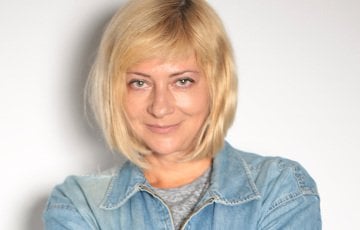The World Fresh Air Day
6- Iryna Khalip
- 3.05.2024, 19:05
- 14,626

They will return.
In the designation of the World Press Freedom Day the key word is not “press” at all, but “freedom”. For our country, which has neither freedom nor the press, the name of this day sounds as abstract as the Chinese dragon boat festival: it seems beautiful, but what does it have to do with us?
The dragon boats, of course, sailed somewhere into the Chinese distances and are unlikely to ever sail to us in Svislach or Biarezina. But we remember Press Freedom Day every year, although it is as distant as those boats. But here everything is simple: in our prisons there are dozens of journalists for whom freedom of the press was air. And when it became impossible to breathe in the country, they were sent to jail: let them die there from suffocation.
The other day, a former political prisoner refused to talk to me for an article. You should understand, he wrote, I feel such a shame before those who stayed there; I feel powerless and insignificant because I came out and they didn’t. I understand him perfectly. I, too, sometimes feel ashamed because my colleagues are in prison, and I am free and cannot help them. But at least remembering them, talking about them, admiring them, especially on the day of freedom of the press — this is the minimum that I can do for them today.
Dzianis Ivashyn, sentenced to 13 years in prison for “high treason,” has been transferred to the prison regime. A brilliant investigator, thanks to whom we learned at one time that after the victory of the Maidan in Ukraine and the disbandment of Berkut, many Berkut members quietly crawled to Belarus and became riot police. Dzianis Ivashyn was the first to sound the alarm, claiming that not the declared number of Russian military personnel and equipment would come to Belarus for the West-2017 exercises, but much more. And so it turned out. I have no doubt: if Dzianis had not been imprisoned back in 2021, today we would know much more about Belarus’ participation in the war against Ukraine.
Dzianis is from Hrodna, and Larysa Shchyrakova is from Homel. If Dzianis, like no one else, knew how to work with data and conducted investigations without leaving home, then Larysa, on the other side of Belarus, at that time rushed around, from action to action. If someone went to the picket, Shchyrakova was there. If someone was on trial, Larysa rushed there. She was known in all Homel courts. And when she herself was tried (by the way, more than twenty times), Larysa would come to court, hanging a cardboard poster around her neck with the inscription “I am a “dishonest” journalist,” or simply with a noose around her neck. In December 2022, the noose tightened, and now Larysa is in a Homel penal colony. Perhaps very close to her home.
Andrzej Poczobut, on the contrary, is far away — in Navapolatsk. Six months in the cell-type premises, three months in the punishment cell. Possibly the most irritating jailed journalist for Lukashenka. How could it be otherwise: one sentence to Poczobut and the Babrouniki border crossing gets closed. It is about him that Lukashenka says something all the time: either trying to exchange him or, on the contrary, refusing to do so. Either he offers Poczobut to go to Poland, or sends Andżelika Borys to meet with the journalist in the colony. In a word, he doesn’t know what he wants. But Andrzej knows exactly what he wants. That same freedom. It's for freedom that he is serving time in jail.
I can endlessly revive in my mind the fantastic work of Aliaksandr Mantsevich, who stubbornly continued to work on his “Regional Newspaper” when everything around was already destroyed, and the count was not in days, but in hours. He had time, he would have left if he wanted to. He didn't want to. I can again remind you of Katsya Andreyeva’s last stream from the event in memory of Raman Bandarenka, when there was already a knock on the door of the apartment from the balcony of which Katsya was broadcasting that stream, but she remained on the air. I can remember the cheerful and daring filming of Ales Liubianchuk, Iryna Leushyna’s call to her colleagues a few days before her arrest — “ask for help while I’m free!” — and the video reports shot by Andrei Tolchyn. And a lot more — how we gathered for rallies, how we helped each other out and believed that we would continue to meet, enjoy each other and do our job, which is really the air for us. And our common imagination, even if multiplied many times over, would not be enough to imagine today as a reality.
When they all return, fresh air will return to Belarus with them.
Iryna Khalip, exclusively for Charter97.org









